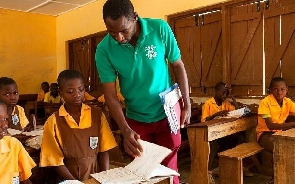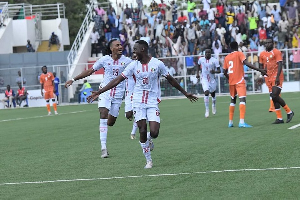A lecturer at the Department of Health, Physical Education, Recreation and Sports at the University of Education, Winneba, has observed that the high attrition rate in the nation’s education sector poses a great threat towards the future of the nation’s education and development.
Dr. Medina Srem-Sai was speaking during the World Teachers Day Celebrations and Teacher Prize 2024 held by the Ghana National Association of Teachers (GNAT) in Collaboration with the Ghana Education Service (GES) at the Kwahu-North District of the Eastern Region.
16 Teachers were awarded with TV sets, citations and cash prizes.
Speaking on the theme, “The teachers we need for the education we want: the global imperative to reverse the teacher shortage,” guest speaker at the event, Dr. Medina Srem-Sai bemoaned the decreasing number of qualified teachers across the globe, positing that the situation required the attention and intervention of all players.
“The world is facing a serious predicament that threatens the very foundation of our education system which is the severe shortage of qualified teachers,” said Dr. Srem-Sai. “The increasing global teacher shortage is a crisis that demands serious attention by stakeholders in education.”
While arguing that there was the need to ensure quality education and grooming that can sharpen teachers to inspire, motivate and empower students to succeed throughout their academic journey, the lecturer however noted that many students lacked access to adequate and qualified educators, hindering their potential in the process.
The situation, she underscored does not only undermine the foundation of the education systems and thereby compromising the future of children and society as a whole but continues to affect and adversely impact many developed and developing nations.
According to the United Nations Educational, Scientific and Cultural Organization (UNESCO), the world needs to recruit approximately, 69 million teachers to achieve the goal of universal primary and secondary education by 2030.
The shortage is most acute in subject areas like Mathematics, Science, Technology, and Special Education, where the demand for qualified teachers far exceeds the supply.
The situation however appears to receive very little attention from leaders.
Expressing regret over this, Dr. Medina Srem-Sai said, “The teacher shortage which seems to be given the least concern by decision makers and major stakeholders has far-reaching consequences including reduced academic achievements, increased dropout rates, child-youth delinquency and decreased economic growth among a few.”
Narrowing down on challenges causing increasing teacher shortage in the Afram Plains, the guest speaker observed that there are more context-specific challenges peculiar to teachers who have dedicated themselves to stay and teach in the Kwahu Afram Plains North and South Districts in the Eastern Region.
These challenges, she said, continue to increase the attrition rate of teachers in the area, adding that the Afram Plains may have spaces and all the infrastructure needed for quality education but would not have the teachers required for the learners.
She identified the inaccessibility of the area, difficulty of teachers in accessing amenities, resources, and opportunities for career development due to the area’s rural nature, poor road networks, limited public transportation system and regular breakdown of the ferries as dire challenges facing teachers in the area.
Others include self-placement/postings, lack of sponsorship opportunities and packages, poor accommodation, inadequate teaching and learning materials. inadequate infrastructure, and limited access to professional development opportunities.
“This situation negatively impacts teacher morale, motivation, job satisfaction, and overall well-being, ultimately affecting their ability to deliver quality education,” said Dr. Medina Srem-Sai.
To address the challenges, she appealed to the major stakeholders including the government, the GES, MPs, District Assemblies, amongst others to help fix all the deplorable roads in the two districts of the Kwahu Afram Plains to enable teachers travel safely to school at all times.
She also appealed to them to ensure that the ferries are in good working conditions and well-maintained and called for the provision of vehicles, motor bikes, bicycles, transport allowances as well as life jackets and reliable means of transport on the surrounding water bodies, for the teachers.
On his part, Mr Theophilus Avor, Kwahu-North District vice chairman of GNAT who represented the chairperson acknowledged the dedication and hard work of teachers who strive to provide excellent education despite the daunting challenges, adding that the Association equally recognize the urgency to attract, retain, and support talented educators to meet the demand of the rapidly changing world.
He described the theme for the celebration as apt and appropriate especially with the attrition rate of teachers in the Kwahu-South District.
Mr. Avor however praised the perseverance and commitment of the teachers in the face of the difficulties.
He appealed to government to expedite action on the implementation of the deprived teachers’ allowance as it’ll go a long way to attract and retain teachers in the deprived districts and for that matter Teachers in the Afram Plains.
Touching on the worrying galamsey crisis confronting the nation, he stressed, “GNATstands against Galamsey, in view of the fact that Ghana is at the crossroads between life and death: The time to act is now, against the backdrop of happenings in the country.”
Regional News of Monday, 7 October 2024
Source: Michael Oberteye, Contributor

















